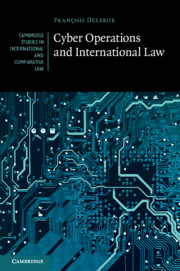Refine search
Actions for selected content:
6 results
Informal international law-making: A way around the deadlock of international humanitarian law?
-
- Journal:
- International Review of the Red Cross / Volume 104 / Issue 920-921 / August 2022
- Published online by Cambridge University Press:
- 26 July 2022, pp. 2111-2130
- Print publication:
- August 2022
-
- Article
- Export citation
4 - Say That Again, Please: Repetition in the Tallinn Manual
-
- Book:
- Repetition and International Law
- Published online:
- 20 January 2022
- Print publication:
- 03 February 2022, pp 95-114
-
- Chapter
- Export citation
Limited Force and the Return of Reprisals in the Law of Armed Conflict
-
- Journal:
- Ethics & International Affairs / Volume 34 / Issue 2 / Summer 2020
- Published online by Cambridge University Press:
- 08 July 2020, pp. 175-188
-
- Article
- Export citation

Cyber Operations and International Law
-
- Published online:
- 28 February 2020
- Print publication:
- 19 March 2020
On the Relationship Between the Ethics and the Law of War: Cyber Operations and Sublethal Harm
-
- Journal:
- Ethics & International Affairs / Volume 31 / Issue 4 / Winter 2017
- Published online by Cambridge University Press:
- 08 December 2017, pp. 467-477
-
- Article
- Export citation
Expertise, Uncertainty, and International Law: A Study of the Tallinn Manual on Cyberwarfare
-
- Journal:
- Leiden Journal of International Law / Volume 26 / Issue 4 / December 2013
- Published online by Cambridge University Press:
- 08 November 2013, pp. 793-810
-
- Article
- Export citation
